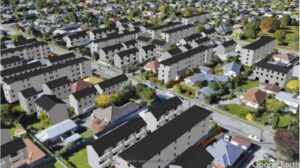
The Christchurch City Council is objecting to the proposed 3 Storey as-of-right legislation which is currently being considered in parliament. This week the Press reported:
The council was also concerned the changes would allow more homes to be built in areas that were not close to public transport, schools or parks.
It wanted clarification of the term “urban” because it was worried the existing broad definition would mean small towns and settlements including Akaroa could be included.
The council has also called for robust design standards to be introduced, along with a minimum density of 15 households per hectare, and it wanted a greater acknowledgement of “wellbeing” in the legislation.
Under the Local Government Act, councils had to play a role in promoting the social, economic, environmental and cultural wellbeing of their communities, but the council did not believe the proposed law took this into account.
Here’s the link to the article:
https://www.stuff.co.nz/the-press/news/126920846/city-council-pushes-for-change-to-governments-new-housing-rules#comments
Brilliant article on housing intensification bill:
Below is an article on a Bill being rushed through Parliament to implement the 3 storeys as of right legislation by Professor Nicole Moreham. In the article she questions the rushed nature of the legislation. Here are some quotes:
The bill was introduced to Parliament on October 19 following “secret” discussions between National and Labour. Those discussions resulted in bipartisan support. According to media reports, mayors and city councillors had no idea the bill was coming. Wellington Mayor Andy Foster said he found out about it just one day before the city council was due to debate its own district plan.
Despite this lack of warning, Parliament’s Environment Committee has been given five weeks to report back on the bill, and local authorities and the public had just three weeks to make submissions.
The article continues:
All of the measures just described seem calculated to avoid debate. Labour knew the intensification proposals would be unpopular with many but its timetable suggests it doesn’t really want to hear about it. It knows what it wants to do; and it wants to do it now.
Democracy can be inconvenient for those who want to get things done. It slows down decision-making and leads to unwanted compromise.
He concluding paragraphs are:
The Enabling Housing Supply Bill also steps firmly on local authority toes. The development of appropriate housing obviously involves knowledge of local infrastructure, topography and built environments. Local authorities and their planners are experts in this.
Labour was rightly up in arms when, during its last stint in office, National sacked Environment Canterbury over its handling of water rights and overrode the Christchurch City Council’s decisions on post-earthquake recovery.
But now Labour is making similar arguments about local authorities styming what it regards as public interest decision-making. Now that the shoe is on the other foot, it is proving more willing than supporters might have expected to step into local authority domain.
Urgently pushing through legislation is justified in rare situations where there is a procedural reason for haste or a genuine emergency. Covid has been one such situation. But no government should get used to ruling in this way.
Years of inaction have undoubtedly exacerbated the housing crisis in Aotearoa but changes to council planning rules are not an emergency. Like all major changes, intensifying our cities requires careful consideration with input from a wide range of experts and affected parties. Democratic processes facilitate that.
As the Covid response moves into a more latent phase, Labour should be reinforcing its commitment to proper democratic decision-making in everything it does. Unfortunately, instead, this bill gives us reason to doubt its commitment.
Here is a link to the article: https://www.newsroom.co.nz/pro/undue-haste-on-housing-bill
Leave a Reply